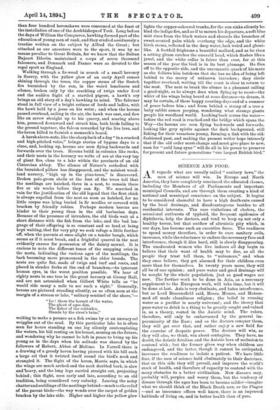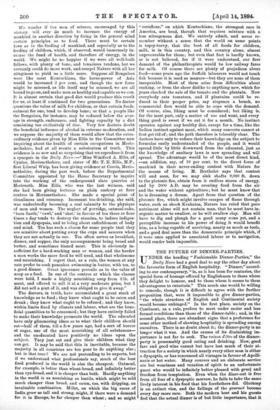SCIENCE AND FOOD.
AS regards what are usually called " sanitary laws," the men of science will win. In Europe and North America, they have completely convinced the educated classes, including the Members of all Parliaments and important municipal Councils, and are through them creating a kind of national and municipal conscience on the subject. It begins to be considered shameful to have a high death-rate caused by the local drainage, and disadvantageous besides to all residential interests. The rare visitations of cholera, the occasional outbursts of typhoid, the frequent epidemics of diphtheria, help the doctors, and tend to keep up not only a healthy terror, but that outflow of altruistic pity which, in our days, has become such an executive force. The readiness to spend money therefore, in order to cure sanitary evils, increases, while the reluctance to endure the necessary fuss and interference, though it dies hard, still is slowly disappearing. The uneducated women who live indoors all day begin to believe that their want of health may be due, as all the people they trust tell them, to " nuisances," and when they once believe, they get alarmed for their children even more than for themselves. In twenty years more, they will all be of one opinion ; and pure water and good drainage will be sought by the whole population, just as good wages are now. The further work to be done in Asia, as a necessary supplement to the European work, will take time, but it will be done at last. Asia is very obstinate, and hates interference, but as Lord Beaconsfield said, Moses, Munoo, and Mahom- med all made cleanliness religion ; the belief in running water as a purifier is nearly universal ; and the theory that pure water to drink is a thing to be greatly sought and valued is, as a theory, rooted in the Asiatic mind. The rulers, therefore, will only be embarrassed by the general im- pecuniosity of the East; and as the doctors conquer them, they will get over that, and rather enjoy a new field for the exercise of despotic power. The doctors will win, as they will also, we think, win about contagion. They have, no doubt, the Asiatic fatalism and the Asiatic love of seclusion to contend with ; but the former gives way when children are endangered, and the latter, though it cannot be extirpated, increases the readiness to isolate a patient. We have little fear, if the men of science hold obstinately to their doctrines, that on this side they will prevail, and improve the world's stock of health, and therefore of capacity to contend with the many obstacles to a better civilisation. New diseases may, probably will, perplex and worry them, but the tendency of disease through the ages has been to become milder—imagine what we should think of the Black Death now, or the Plague —and as insurance offices well know, there is an improved habitude of living on, and in better health than of yore. We wonder if the men of science, encouraged by this victory, will ever do much to increase the energy of mankind in another direction by fixing in the general mind certain principles as to food. There must be certain laws as to the feeding of mankind, and especially as to the feeding of children, which, if observed, would immensely in- crease the fund of health, and therefore of energy, in the world. We might be no happier if we were all well-built fellows, with plenty of bone, and tenacious tendons, but we certainly could do more work, and compel Nature with all her stinginess to yield us a little more. Suppose all Bengalees were like most Kentuckians, the horse-power of Asia would be increased 2 per cent, and though the new force might be misused, as life itself may be misused, we are all bound to goon, and make men as healthy and capable as we can. It is almost certain. that good diet would produce this result for us, at least if continued for two generations. No doctor questions the value of milk for children, or that certain foods, oatmeal for one, tend to develop bone; or that a people like the Bengalees, for instance, may be reduced below the aver- age in strength, endurance, and fighting capacity by a diet consisting too exclusively of rice. Very few doctors doubt the beneficial influence of alcohol in extreme moderation, and we suppose the majority of them would allow that the extra- ordinary evidence given by Miss Ellis to the Committee now inquiring about the health of certain occupations in Merio- nethshire, had at all events a substratum of truth. This evidence is so new and so surprising that we reproduce it from a synopsis in the Daily News :—" Miss Winifred A. Ellis, of Cynlas, Merionethshire, and sister of Mr. T. E. Ellis, M.P., first Liberal Whip, has been giving evidence at Corris, Merio- nethshire, during the past week, before the Departmental Committee appointed by the Home Secretary to inquire' into the working of the underground slate quarries at Merioneth. Miss Ellis, who was the last witness, said she had been giving lectures on plain cookery at four centres in Merionethshire. She made a special point of cleanliness and economy. Incessant tea-drinking, she said, was undoubtedly becoming a real calamity to the physique of men and women. The neglect of porridge, oatmeal-cake, bars, llaeth," caw]; and ' shot,' in favour of tea three or four times a day tends to destroy the stamina, to induce indiges- tion and dyspepsia, and to bring about enfeeblement of body and mind. Tea has such a charm for some people that they are sensitive about putting away the cups and saucers when they are not actually in use. Tea often serves as breakfast, dinner, and supper, the only accompaniment being bread and butter, and sometimes tinned meat. This is obviously in- sufficient for a hard-working man or woman, and the harder a man works the more food he will need, and that wholesome and nourishing. I regret that, as a role, the women at any rate prefer to cook pancakes swimming in butter, with tea, to a good dinner. Great ignorance prevails as to the value of soup as a food. In one of the centres at which the classes were held, I made a highly nourishing soup from 8 lb. of meat, and offered to sell it at a very moderate price, but I did not sell a pint of it, and was obliged to give it away."
The doctors, in truth, have accumulated a great stock of knowledge as to food ; they know what ought to be eaten and drank; they know what ought to be refused; and they know, within limits fixed by climate and labour, what are the bene- ficial quantities to be consumed; but they have entirely failed to make their knowledge permeate the world. The educated have only glimmering ideas as to what their children should eat—half of them, till a few years ago, had a sort of horror of sugar, one of the most nourishing of all substances— and the uneducated have positively no ideas upon the subject. They just eat and give their children what they can get. It may be said that this is inevitable, because the majority in all countries are too poor to do anything else ; bat is that true ? We are not pretending to be experts, but if we understand what professionals say, much of the best food produced in the world is also the cheapest. Oatmeal, for example, is better than wheat-bread, and infinitely better than rye-bread, and it is cheaper than both. Hardly anything in the world is as nourishing as lentils, which might be sold much cheaper than bread, and eaten, too, with dripping, an invaluable combination. Millet, on which the big races of India grow so tall and strong, might, if there were a demand for it in Europe, be far cheaper than wheat ; and so might " cornflour," on which Kentuckians, the strongest race in America, are bred, though that requires mixture with a less nitrogenous diet. We entirely admit, and never re- member without a sense that the world on some points is topsy-turvy, that the best of all foods for children, milk, is in this country, and this country alone, almost unprocurable for them ; but even that fact is hardly known, or is not believed, for if it were understood, our first demand of the philanthropists would be low railway fares for milk. Of course there are plenty of prejudices about food—some years ago the Suffolk labourers would not touch fish because it is used as manure—but they are none of them insuperable. Most of them arise from difficulties about cooking, or from the sheer dislike to anything new, which for years checked the sale of the tomato and the plantain. Now everybody eats tomatoes, and if plantains could be re- duced to their proper price, say sixpence a bunch, no commercial fleet would be able to cope with the demand. Of course, also, liking must be considered; but liking is, for the most part, only a matter of use and wont, and every thing good is sweet if we eat it for a month. No instinct operates against any healthy diet, except for a time, like the Indian instinct against meat, which many converts cannot at first get rid of ; and the path therefore is tolerably clear. The doctors have only to reduce their knowledge on the subject to formulas easily understanded of the people, and it would spread little by little downward from the educated, just as the knowledge of sanitary laws is now spreading and will spread. The advantage would be of the most direct kind, —an addition, say, of 10 per cent. to the direct force of mankind in their never-ending contest with Nature for the means of living. M. Bertholot says that contest will end soon, for we may sink shafts 9,000 ft. down to the plutonic fire, obtain from it endless stores of energy, and by 2000 A.D. may be creating food from the air and the water without agriculture; but he must know that he is dreaming a dream. Apart from that question of the plutonic fire, which might involve escapes of flame through water, such as shook Krakatoa, Nature has ruled that pure nutriment alone will not sustain man, that he must have in- organic matter to swallow, or he will swallow clay. Man will have to dig and plough for a good many aeons yet, and a perceptible increase to his power of doing it would benefit him, as a being capable of surviving, nearly as much as tools, and a good deal more than the democratic principle which, if it were once applied to associated labour or to navigation, would render both impossible.



































 Previous page
Previous page